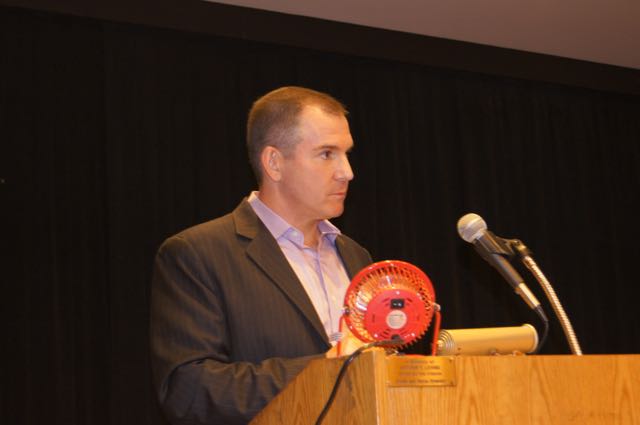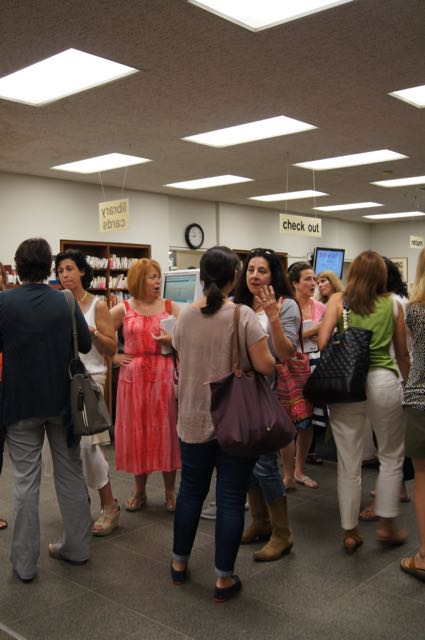NY Times Columnist Frank Bruni Addresses College Admissions Mania at the Scarsdale Library
- Category: Schools
- Published: Wednesday, 15 July 2015 14:49
- Joanne Wallenstein
 New York Times columnist Frank Bruni packed a room of concerned parents, high school deans, empty nesters and grandparents when he came to the Scarsdale Library on Tuesday July 14th to discuss his book, "Where You Go Is Not Who You'll Be: An Antidote to the College Admissions Mania." As the number of applications rise and admission rates to selective colleges falls into the single digits, panic has ensued about the process of getting into the "right " college. From the time they can read, kids see college stickers plastered on family cars – advertising the schools that their children attend. What message is that sending to our kids? Is college admittance the goal of a Scarsdale education?
New York Times columnist Frank Bruni packed a room of concerned parents, high school deans, empty nesters and grandparents when he came to the Scarsdale Library on Tuesday July 14th to discuss his book, "Where You Go Is Not Who You'll Be: An Antidote to the College Admissions Mania." As the number of applications rise and admission rates to selective colleges falls into the single digits, panic has ensued about the process of getting into the "right " college. From the time they can read, kids see college stickers plastered on family cars – advertising the schools that their children attend. What message is that sending to our kids? Is college admittance the goal of a Scarsdale education?
Parents feel pressure to hire tutors and private college counselors to give their child every advantage. Students are focused on grades and "getting in" rather than enjoying high school and developing a love of learning and intellectual curiosity.
To what end? Bruni contends that those who attend the Ivy's or other highly selective schools are no more likely to succeed or find happiness than their peers who attend less selective institutions. Siting statistics about the resumes of the CEO's of the Fortune 500 companies, recipients of MacArthur "Genius Awards," and Fulbright scholarship winners, he demonstrates that where you attend college does not define future success. Even among his colleagues on the editorial staff at the New York Times, only a few sport degrees from an Ivy League School. Furthermore, a 2011 study by a Princeton economist and mathematician found that there was no earning differential between those who attended an Ivy League school and those who applied to, but had not attended an Ivy.
He asked the audience, ""If you are getting kids private SAT instruction, paying for summer experiences, paying for college counselors, what are you telling your children? Are you saying they can't do it on their own and everything can be bought? Bruni predicted that college admissions officers will soon pay little attention to the essay portion of the application, as they know that so many are written by professionals.
 Though parents and students believe that the most selective school is the right school to attend, in fact highly competitive schools may not be right for all. Many students fail to flourish in an environment that Bruni called "overpopulated with overachievers.". Bruni says that studies show that students who do best in college are deeply engaged in a research assignment or a student organization – which may be easier to do at a school where a student is able to make personal connections with faculty and a diverse student body. He said, "we need to redirect the conversation from how to get into college to how to best use the college experience to succeed later on."
Though parents and students believe that the most selective school is the right school to attend, in fact highly competitive schools may not be right for all. Many students fail to flourish in an environment that Bruni called "overpopulated with overachievers.". Bruni says that studies show that students who do best in college are deeply engaged in a research assignment or a student organization – which may be easier to do at a school where a student is able to make personal connections with faculty and a diverse student body. He said, "we need to redirect the conversation from how to get into college to how to best use the college experience to succeed later on."
Though many in the room nodded their heads in agreement with Bruni, they wondered how they could adopt his view without putting their own children at a disadvantage. If classmates go to SAT and ACT tutors and hire college counselors to assist with their applications, can they deny their own children these same advantages? As one mom said, "I can't make a guinea pig out of my own child."
A parent commented, "Stanford and Harvard were always there – why is there this focus on getting into these schools now? Bruni said, "Now these same schools are getting applications from a much wider demographic area. All sorts of people who never aspired to those schools now aspire to go there. Applications from foreign students are up as well.
Another woman in the audience sounded a hopeful note, saying, "What makes me feel good is that there was a waiting list for hearing you speak – meaning that many want to get off this hamster wheel!"
At the end of the talk, a long line of attendees waited to buy Bruni's book, speak to him and ask him to sign their copy. Perhaps he influenced at least some parents to change the way they define success for their children.







